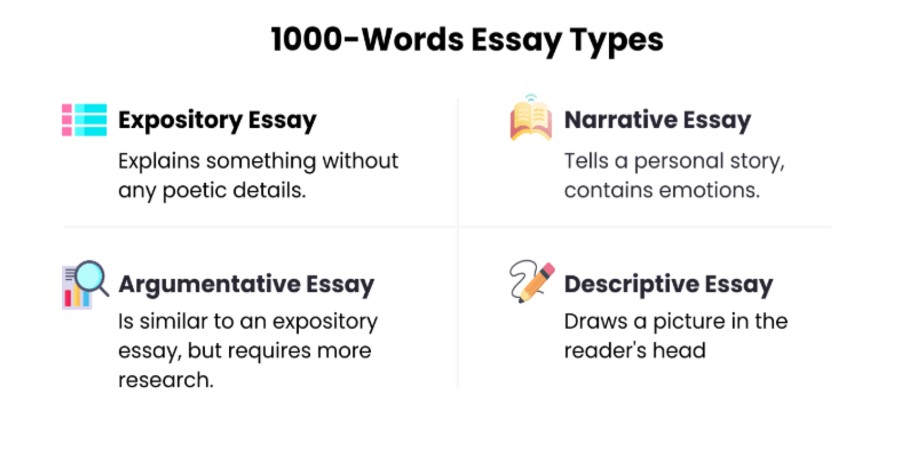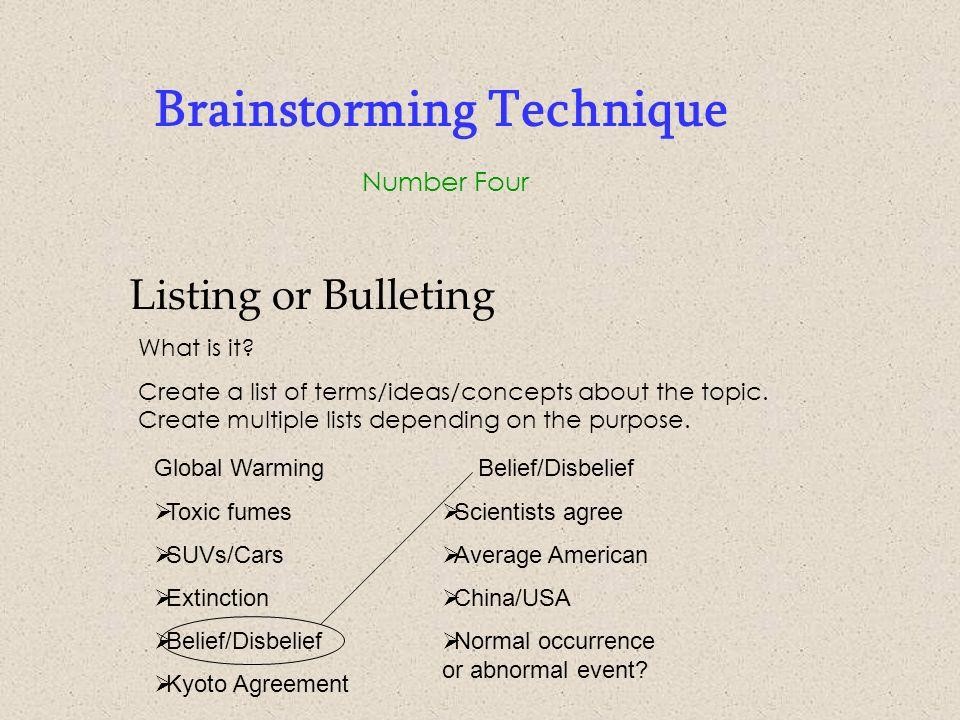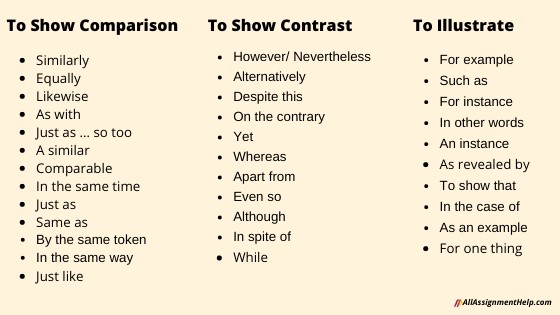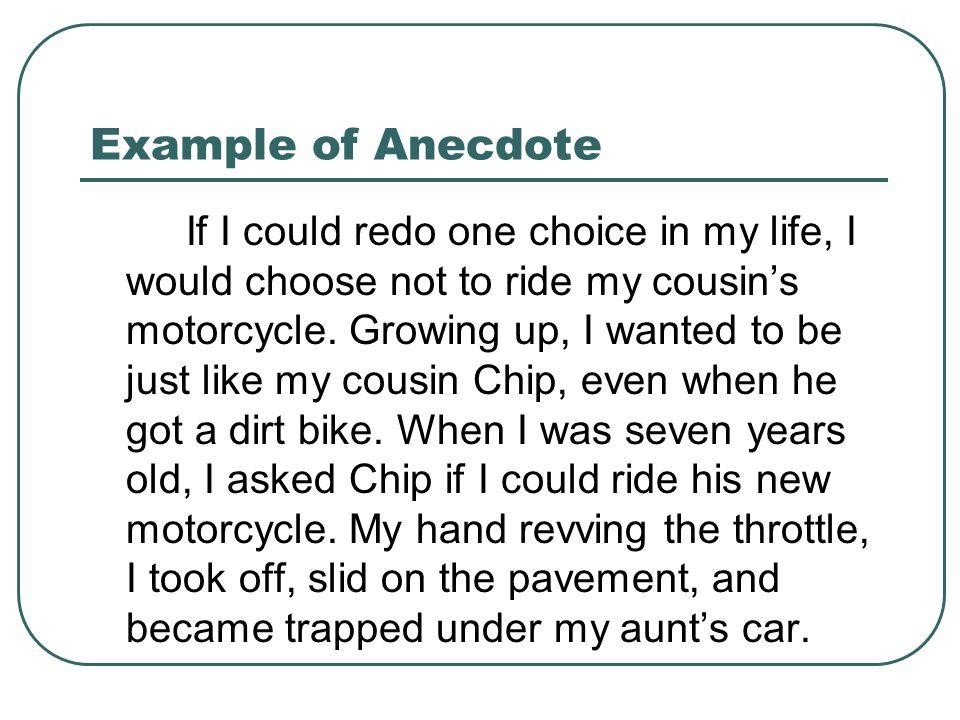While students learn, they have to write a great variety of essay types. Each type has its peculiarities and specifications. Many students are afraid of writing quite long essays. One of them is a 1000-word essay. This number scares them away and makes them grow desperate. However, it’s not that difficult if you look at it from a different angle.
How long is a 1000-word essay? This question can be easily answered. How difficult is it? We can assure you that there is nothing complicated about this long academic paper. Don’t review it as a long project. It is a simple essay with more words than you got used to. It has quite the same structure, and you won’t be puzzled by some uncommon sections and demands. It can be accomplished in a single day or faster if you know what to do. This informative guide explains how to handle this challenge without much pain.
Useful Tip #1 – Before starting to write an essay make sure you understand the task as there are 4 types of essays:

Understand the Purpose of Your 1000-Word Paper
First, read your assignment attentively because the clarity of your understanding plays a decisive role. If you don’t understand what must be disclosed, you are doomed to fail. Therefore, read it attentively and make sure it’s clear. You may ask your teacher or professor to clarify what is uncertain.
You should focus on such words as:
- Explain;
- Analyze;
- Compare;
- Contrast;
- Show, etc.
These are the keywords to any piece of writing. The purpose of your 1000-word essay may openly state:
- Analyze the poem by Robert Burns.
- Compare and contrast the 20th and 21st centuries in the business industry.
- Explain the meaning of “bravery”.
Compile Your Sources and Evidence
Once you’re through with the understanding of the main question, begin to gather evidence. Look for all closely or remotely related documents, surveys, research, etc. Compile them and take notes. Review your notes attentively to understand what facts can be used in your essay. Make sure they clearly explain your purpose.
If you don’t know what can help the development of the main question, begin to brainstorm the ideas. The process of brainstorming can run in the following ways:
- Write down the keywords and facts in “bubbles” or “clouds”;
- Draw a tree with branches and leaves that introduce related ideas and purposes;
- Create bullet lists with everything that surely must be mentioned in your essay;
- Use fee writing to simply pour down all the associations with your topic for around 15-20 minutes.
Organize Your Ideas into an Argument
Obligatorily review all your notes, ideas, and concepts. You ought to define the main argument of the entire essay. However, you will need sub-ideas as well that are derived from the main point. You should:
- Define the overcoming point;
- Compare and contrast your main question with a counterargument;
- Outline the issues you are supposed to disclose.
Useful Tip #2 – Use brainstorming techniques to cope with this task more effectively

Craft a Good Thesis Statement
The most important part of your essay is a thesis statement. It should be a short, clear, and strong sentence that clearly explains the purpose of the entire research. Here are a few vital tricks you should follow and know:
- Place the thesis statement at the end of your introduction;
- Create the “working” thesis, which can be changed when the final version is written;
- Build the whole essay around your thesis;
- Add sub-theses that are closely related to the main idea of the essay;
- Enhance the thesis if the outcomes of your essay differ from the ones you have assumed at the beginning of your writing.
Useful Tip #3 – Use powerful linking words

Start to Draft
When you are done with the preliminary part, go to the writing part. The 1000-word essay has the same structure as any other essay type. It consists of:
- Introduction. It provides general facts and a thesis statement.
Useful tip #4. It should not be weak!
- Main plot. It develops the thesis statement and explains the purpose of the essay.
Useful Tip #5 – Pay attention to each detail of the main part
- Conclusion. It summarizes and interprets the outcomes.
Useful tip #6 – Don’t make your conclusion unclear and vogue
Before you start to write, create a good plan. It helps to organize the entire working process and thus saves precious time. You are free to choose any format of the writing plan – 1, 2, 3… or A, B, C… each point includes some vital facts, tips, or instructions for writing. These may be:
- The name of sections and paragraphs,
- Timeline;
- Tools necessary to write;
- Methods necessary to carry out research;
- Tips that help to be fast, etc.
Write the Introduction
The first writing section is called an introduction. It plays a vital role in getting the attention of potential readers. A good introduction:
- Introduces general facts,
- Has a “hook” to grab attention,
- Prepares readers for the bigger goal;
- Provides a thesis statement.
If you want to make your intro catchy, use something uncommon that grabs the attention of readers. You can use various means. These are:
- Citations;
- Anecdotes;
- Shocking statements;
- Rhetoric questions, etc.
Useful tip#7 – Use classic anecdotes. They are well-known yet funny.

Continue with a Clear Plot
The logical continuation of every introduction is the main plot. It is supposed to include sub-theses of the main argument. These theses ought to review the argument from all possible angles and thus clearly disclose it to your readers. It’s vital to make your plot readable and clear. Follow the next prompts:
- Cover one point in one paragraph;
- Avoid repetitions;
- Stick to the active voice;
- Don’t overuse citations (1 citation per 500 words);
- Add clear examples and explanations;
- Get rid of clichés, unknown terms, jargon, etc.;
- Write short sentences.
A big plus of long essays is the possibility to explain everything that occurs to the mind. Oftentimes, 500-word essays are not enough for students to fully show what they mean.
Write a Clear Conclusion
The defining part of this essay is called the conclusion. Its purpose is clear – summarize the outcomes of your research. Remember the next point:
- Restate the thesis in other words;
- Mention the main points;
- Interpret the outcomes;
- Use 3-5 sentences only!
Summing Up
As you can see, there’s nothing complicated about writing a 1000-word essay. It has the same parts as for any ordinary 500-word essay. If it seems too big for you, break it down into smaller chunks. It will help your mind to overcome the fear of its length. Our guide provides the necessary prompts that clearly explain how to write a 1000-word essay in one night. You won’t spend much time and strength, and will submit a perfect piece on time!



